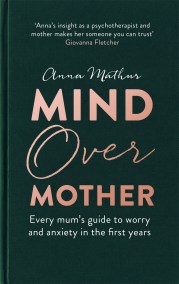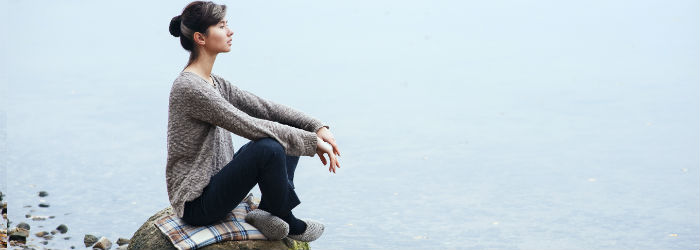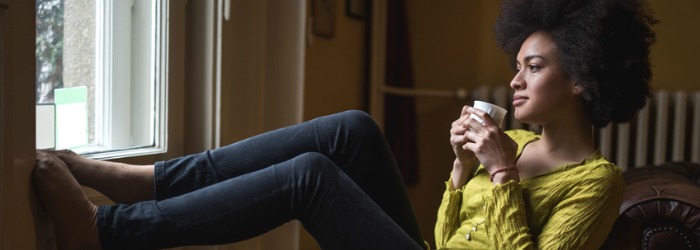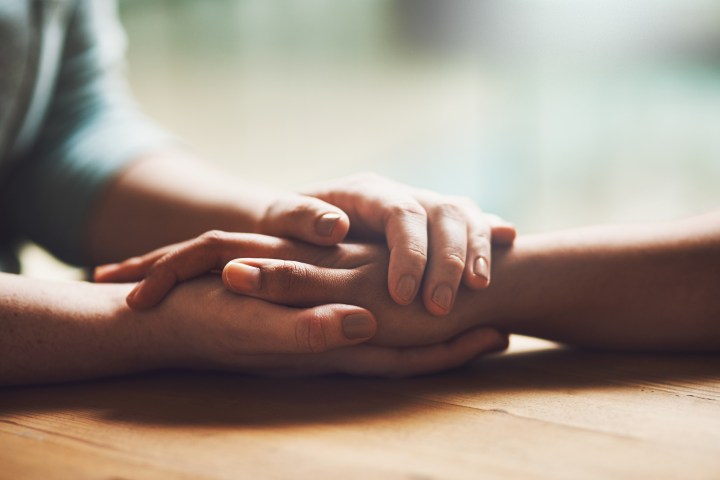How to recognise anxiety if you’re a new mum

Anna Mathur is a mum of three, an experienced Psychotherapist and passionate psycho-educator, with a specialism for working with women. In this extract from her book Mind over Mother: Every mum’s guide to worry and anxiety in the first years, Anna talks to us about how to start recognising your own anxious thoughts.
It seems to have become culturally acceptable to spend our lives teetering back and forth between worry and anxiety. As mothers, we tend to quickly demote all the things that might help us feel more relaxed and grounded. It takes more time and effort to schedule in some space, to focus on a breathing exercise, to call a friend or to go for a walk than it takes to fall back on our habit of ruminating. Habits are habits because they are so much easier to engage in, regardless of how unhelpful they are. And because it has become culturally acceptable, we forget that we can do something to change it and make things better for ourselves. Anxiety is the thief that steals precious headspace, impacting our peace and enjoyment of motherhood. To be able to change this, we must first get down to the bones of anxiety.
Drawing the line
I imagine anxiety sitting on a line amidst other emotional states.
Oblivious —- Chilled —- Concerned —- Worried —- Anxious —- Panicked —- Frozen
We move along that line constantly. We may have patches of time where we linger more towards one end than the other or bob around the centre. It’s good to consider where you spend most of your time and how quickly it takes you to hop from one position to another. Next time you have a strong feeling, observe where you might have moved along the line and what may have triggered that shift. Identify the feelings that have come with it, both physically and emotionally, and what it does to your energy levels too. This awareness can really help you as you learn more about yourself and what prompts you to be nudged or catapulted up or down the line.
Hearing the white noise
You may have ‘generalised anxiety’ or some other similar label in your doctor’s notes. You may have self-diagnosed after reading about anxiety in books or online. Perhaps you recognise the general feeling of fear bubbling in the background like white noise that has become part of the soundtrack to your life. I use white noise a lot for Florence’s naps when out and about. I have a machine that plays noise in her buggy. I forget it’s there. So many times I have walked into a shop and people have stopped to look round. Has someone left a tap running? Is there a gas leak? I spot their confused faces and explain. The noise that my ears have blocked out is so loud to them. Sometimes I’ve forgotten to turn her white noise off because it has blended into the background. She may be happily awake before I realise that the sound is still blasting unnecessarily. I switch it off. Wow – the quiet that follows where before there had been a roar. We become so used to our own thought processes and anxieties. We can begin to accept them as ‘part of who we are’, or ‘just the way I think’. Then, we forget how loud and impactful they are. We become almost immune to the bearing they have on our emotions and headspace. We forget how it used to feel to have a more calm mind. Shoulders that felt less tense. Feet that meandered. A mind that could focus because it wasn’t so scattered and worried. Does anyone else feel a tad smug when someone tells you your shoulders are tense? I do! I don’t know why a part of me wears tension like a badge of honour. I’m often battling with the part of my mind that tells me that if I’m not rushing, I’m not doing enough. If I’m not worrying, I’m not loving enough. If I’m not tense, I’m not carrying enough – mentally, emotionally, physically. If I’m not stretched to my max, I should be doing more. How unkind to put such pressure on ourselves. No wonder we feel anxious. It’s like there’s a mini-me standing over me waving a baton going, ‘More. More.’ We get used to feeling anxious. It comes with the territory right? Whilst I would have agreed a few years ago, sighed and eye-rolled with a half-smile, it saddened me because I now believe there is more for all of us. I honestly believe that anxiety doesn’t have to be the background buzz. Fear doesn’t have to be such a factor in the decisions we make for our children and ourselves. It doesn’t have to be the white noise we acclimatise to.
In many ways, it’s great that social media gets us talking openly about some of our feelings and thoughts as mothers. Laughing about mum guilt and the common anxieties. We feel less alone, but is that enough? Are we recognising that what we actually need to do is turn that annoying white noise down? It is possible to turn it down. I have. I do. You can!
If you want to learn more about how to deal with the anxiety of early motherhood read Anna’s book:
THE SUNDAY TIMES BESTSELLER
'With conversations on Maternal Mental Health on the rise, and more women speaking up about the way they feel, Anna Mathur's insight as a psychotherapist AND mother make her someone you feel you can trust. She offers little nuggets of gold while reminding us to point some of our kindness and love inwards.' Giovanna Fletcher, bestselling author of Happy Mum, Happy Baby
'Anna is breath of fresh air - relatable, funny and wise' Sarah Turner, bestselling author of The Unmumsy Mum
Baby-proof the house; panic-proof the mum.
Do you overthink what you said to the mum in the supermarket queue? Is your internal dialogue more critical than kind? Perhaps you wake to check your baby is breathing, or the sight of a rash sends you down an internet search rabbit hole. Whatever your level of anxiety, however much it impacts your life, this book is for you.
Anxiety is making motherhood a less pleasant, more fraught and pressured experience, and we do not have to accept joy-sapping worry and energy-draining overthinking as part of the motherhood job description. In Mind Over Mother, Anna Mathur, psychotherapist and mum of three, explains how to:
* Understand anxiety, why it affects you and what to do about it
* Make your mind a kinder, calmer, happier place to be
* Transform your motherhood experience by addressing your thinking
The most powerful tool Anna has to communicate this isn't the letters after her name, it is the fact that she is open about her own experience of maternal anxiety. By sharing her journey, she gives you the confidence to reframe yours.
Mind Over Mother is full of light bulb moments of realisation. It will have you learning, laughing and loving yourself through the journey of motherhood. You will learn to address the most important conversation you'll ever have - the one inside your head, because investing in your mental health is the best gift you can offer yourself and your child.








